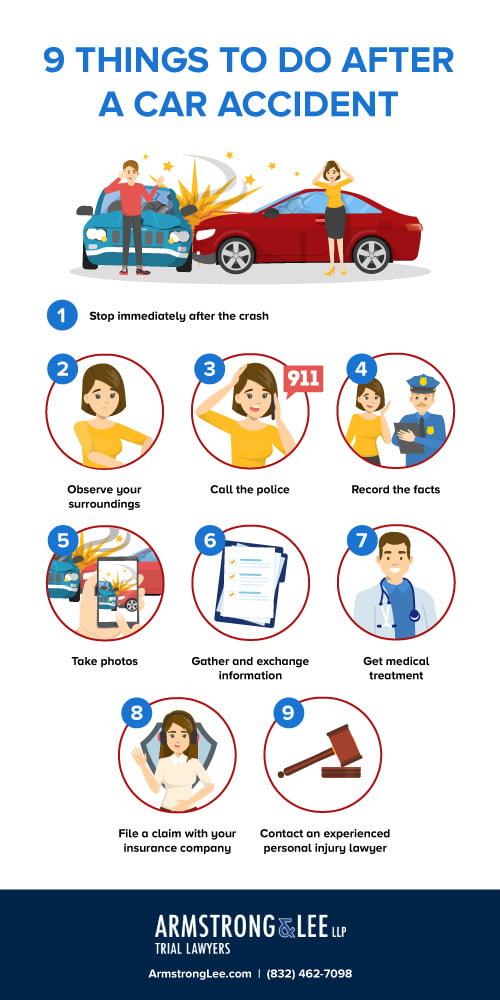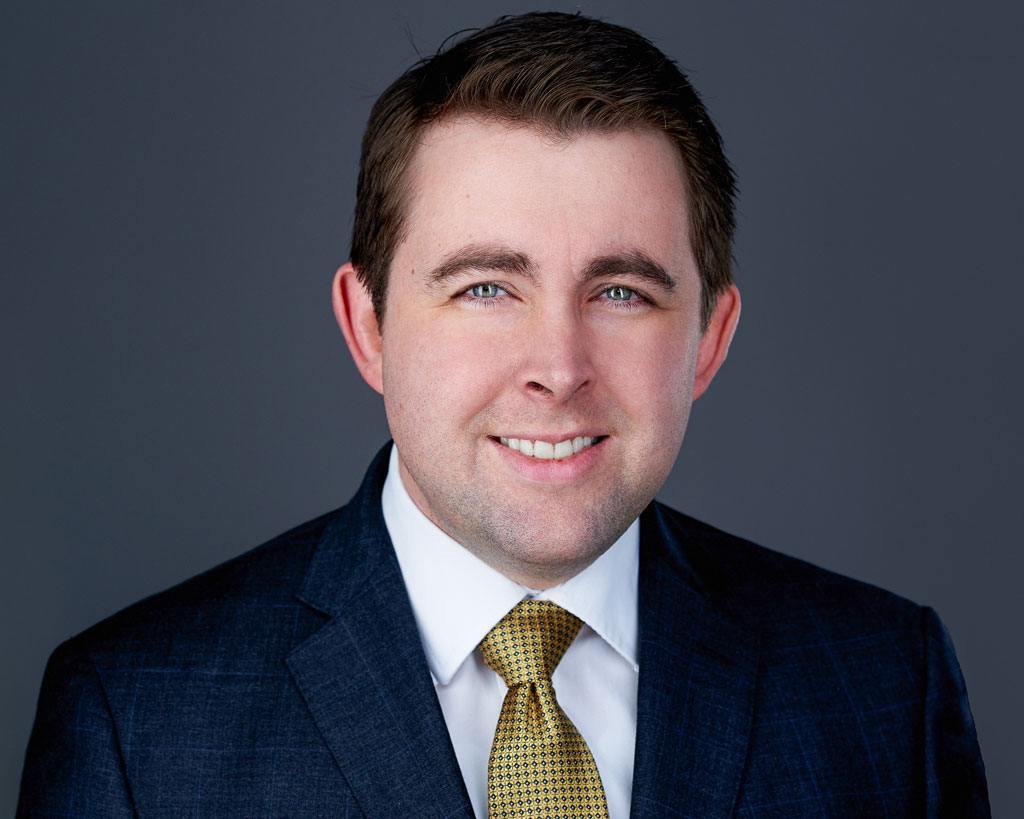A car accident is a stressful and terrifying experience. Our firm has represented many clients who have lost loved ones and who have suffered severe and permanent injuries in motor vehicle accidents.
It can be difficult to know what to do when it happens to you. Panic, fear, and adrenaline may set in, making it difficult to think clearly. No one wants to think about the potential medical bills and legal headaches that may come out of an accident. But insurance companies are thinking about it now. So should you.
There are steps you can take to preserve the evidence and make your case if you need to make a legal claim for injuries. Here are 9 tips to follow after a car wreck. (But only if you are able, and it is safe to do so.)
1. Stop immediately after the crash
Even if a collision is minor, you should always remain at the scene.
It is important to note that fleeing from the scene of an accident is illegal—not to mention you will probably be found at fault, even if the accident was caused by the other driver.
You should also not move the vehicles until the authorities arrive.
It is important to preserve the accident scene initially so that photographs and measurements can be taken if the way that the accident happened is in dispute.
2. Observe your surroundings
Car wrecks can be disorienting—especially serious ones.
You should take a moment to observe your surroundings before exiting your vehicle. Check yourself and your passengers for any injuries. If anyone is injured, do not move them. Instead, call the authorities.

Call 9-1-1. Make sure anyone who may be injured is checked out by the paramedics. If someone is unsure of whether they are injured, it is probably best to call the paramedics anyway—just to be safe.
If there are no visible injuries and everyone seems fine, it is best to call the police.
A police report can often help establish the other driver’s fault and, at the same time, clear you of wrongdoing.
4. Record the facts
Tell the responding officer what happened to cause the accident. Be as accurate as possible, but do not guess. Make sure to tell the officer if you are injured. If you are unsure of how the accident happened or if you have been injured, it is just fine to say “I am not sure” or “I don’t know, officer.”
Assume that everything you say will be written down. Oftentimes, police officers will have bodycams activated when they arrive on the scene, so you should assume you are being recorded, as well.
If you were injured in a car accident, Armstrong Lee & Baker LLP can help review your case.
With a 4.9-star Google review from over 70 clients, the firm has worked hard to build a solid reputation in the Texas community. Contact us online or call 832-402-6637 for a free case review.
5. Take pictures
If safe to do so, make sure to take photos of the scene with your cell phone. If possible, try to get a scene photograph of the cars exactly where the accident occurred, before the vehicles are driven off or moved to a different area. Get photographs of all vehicles involved in the accident, especially the damaged areas. But do not obstruct traffic or put yourself in harm’s way to get scene photographs! Make sure to take a photo of the other driver’s insurance information, license plate, and driver’s license. Photos of your injuries are also very important and will be useful in the future.
6. Gather and exchange information
If police respond to the accident scene, they will usually take charge of gathering the information of all involved parties. Sometimes, however, police do not arrive. If that is the case, it is extremely important that you gather this information yourself. You need to either write down or take a photo of each driver’s license, insurance information, and license plate. Photographs are generally preferred to handwritten notes in case they need to be referenced later. If there are any witnesses to the accident, make sure to obtain their contact information—including their name and phone number.
7. Get medical treatment
If you are injured after a car wreck, you would be well-advised to call 9-1-1 and make sure an ambulance comes out to the scene. But it is also important to note that injuries and painful symptoms often may not be immediately evident following an accident. In fact, the pain associated with car wreck injuries may not start occurring until a day or two after the accident. If the wreck was serious, it’s better to err on the side of caution and go seek medical attention from the emergency room or your family doctor. Let them make the final decision. When seeing your doctor, you should be general about how the accident happened, but specific as possible about your injuries and symptoms. It is important that you mention every symptom and body part that is hurting or that feels different compared to the moments before the accident.
8. File a claim with your insurance company
After a car wreck, it is important to contact your own insurance company as soon as possible. You should also take this opportunity to discuss all of your policy benefits, and to determine whether there are any medical benefits or personal injury protection benefits available to your under your policy. As your claim is being processed, make sure to keep detailed records of all your injuries.
9. Contact an experienced personal injury attorney
If you were involved in a serious car wreck, an attorney will help you navigate your injury claim, protect your rights, and make sure the insurance companies are treating you fairly. A good lawyer will help you find and preserve evidence, speak to insurance companies on your behalf, and ensure your injuries are being properly taken care of. If you have been involved in a serious accident and believe that the insurance company is treating you unfairly, do not hesitate to call the experienced attorneys at Armstrong Lee & Baker LLP at 832-402-6637 for a free consultation about your case.
Frequently Asked Questions
Absolutely nothing. At Armstrong Lee & Baker LLP, our attorneys work on a contingency fee basis. This means that you owe us nothing unless we win your case, whether that’s in the form of a settlement or a judgment. We offer a free consultation to anyone who thinks they might have a personal injury case.
We suggest speaking with an attorney as soon as possible after your injury. Something to keep in mind is that all personal injury cases need evidence, and that evidence often degrades over time. As a result, many jurisdictions have a strict statute of limitations (or time limit) for filing a claim. In Texas, most victims have only two years from the date of injury to file, so it is important to start building your case immediately.
In the state of Texas, employers have the option of filing for workers’ compensation insurance. This policy covers them in case an employee suffers an injury on the job. However, some employers choose to be non-subscribers, which means they opt out of this coverage and lose certain legal protections. This means that if an injured employee sues them after a work injury, they may end up paying more damages. In addition, they may be liable for pain and suffering, punitive damages, and medical benefits. Learn more about non-subscriber injuries here.
The Texas Department of Insurance (TDI) keeps track of employers that report their non-subscriber status. Currently, you can find a spreadsheet of every reported non-subscriber business in Texas under TDI’s workers’ compensation insurance coverage verification page. This includes the business address, business name, and filing dates. Learn more here.
There are a few different ways to manage your bills while waiting for your case to settle. For medical treatment, it is common to arrange a lien with the doctor’s office or hospital. A medical lien is essentially an agreement to pay back your treatment costs with a portion of your potential settlement. Another option for miscellaneous bills, such as rent, utilities, or other essential expenses, is lawsuit funding. Much like a lien, you pay these loans back with a portion of your settlement or judgment. However, these loans have high interest rates and fees, so be sure to discuss this option with your attorney.
